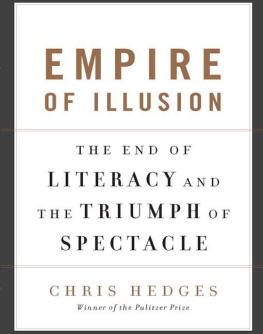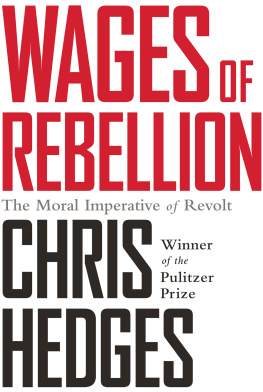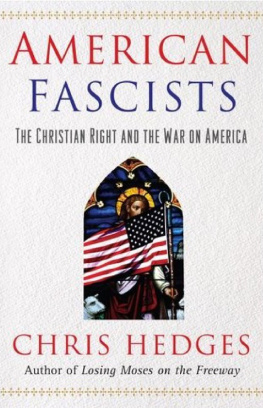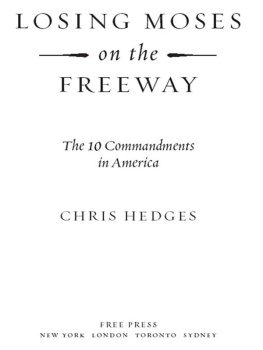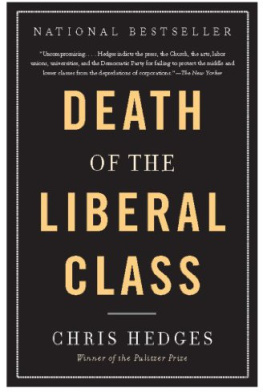Copyright 2016 by Chris Hedges
All rights reserved. No part of this book may be reproduced in any manner without the express written consent of the publisher, except in the case of brief excerpts in critical reviews or articles. All inquiries should be addressed to Skyhorse Publishing, 307 West 36th Street, 11th Floor, New York, NY 10018.
Hot Books books may be purchased in bulk at special discounts for sales promotion, corporate gifts, fund-raising, or educational purposes. Special editions can also be created to specifications. For details, contact the Special Sales Department, Skyhorse Publishing, 307 West 36th Street, 11th Floor, New York, NY 10018 or .
Hot Books and Skyhorse Publishing are registered trademarks of Skyhorse Publishing, Inc., a Delaware corporation.
Visit our website at www.hotbookspress.com
10 9 8 7 6 5 4 3 2 1
Library of Congress Cataloging-in-Publication Data is available on file.
Cover design by Brian Peterson
Print ISBN: 978-1-5107-1273-7
Ebook ISBN: 978-1-5107-1274-4
Printed in the United States of America
Contents
Introduction
By David Talbot
Our media has become such an all-encompassing echo chamber of poweror its corollary, a bright and shiny distraction from our miserythat its a shock whenever a dissident voice breaks through this wall of sound. One of the most singular and bracing voices of dissent in our time belongs to Chris Hedges. He is no stranger to the corporate ranks of journalism, toiling for over two decades as a war correspondent, primarily for the New York Times , where he shared a Pulitzer Prize for team reporting on the events of 9/11. But even as a Times man, Hedges clearly stood out from the press pack. His fearless reporting from Central America (before he joined the Times ), and later from the Middle East, Africa and the Balkans, routinely contradicted the official line, evoking the rigorous independence of his literary heroes, George Orwell and James Baldwin. Like Orwell and Baldwin, Hedges has consistently refused to toe party lines or trim his reporting to fit conventional patterns. He inevitably developed a reputation for being abrasive at the Times , and after he reaffirmed his independence of mind by speaking out against George W. Bushs invasion of Iraq at the commencement ceremony of auntil then placid Midwestern campus, life at the newspaper of record became untenable for Hedges, who struck out on his own.
Life as an independent thinker and writer has presented a different set of challenges. It is not easy to support oneself, much less a family, as a public intellectual without the benefits of a university teaching position or think-tank sinecure or the rainbow of corporate endowments that grace the lives of the dutiful courtiers who dominate our national discourse. Hedges lives in Princeton, New Jersey, but he is not on the faculty at Princeton (although he has had two visiting professorships at the university). He teaches, rather, college credit courses in a maximum security prison. Still, he has managed to make a living through the power of his writing and speakingand although his books are customarily slighted and impugned by his former newspaper, they have attracted a large and loyal following and have succeeded in shouldering their way onto the New York Times Bestseller List.
Among his significant titles are War Is a Force that Gives Us Meaning , a provocative reflection on the gods of fire and death that rule our lives (including, for two decades, Hedges); and American Fascists: The Christian Right and the War on America; Death of the Liberal Class ; and Wages of Rebellion: The Moral Imperative of Revolt books filled with alarming insights into the devolution of American society and politics and radical calls for action, even against seemingly invincible odds.
Hedges, who has put his writing and speaking skills at the services of the Occupy movement and many other apparently quixotic crusades for social justice, calls this indomitable will to resist the sublime madness of the soul, quoting the theologian Reinhold Niebuhr. Perhaps in our lifetimes we will not succeed, Hedges has written. Perhaps things will only get worse. But this does not invalidate our efforts. Rebellion which is different from revolution because it is perpetual alienation from power rather than the replacement of one power system with anothershould be our natural state.
Hedges, who is the son of a Presbyterian minister and a graduate of the Harvard Divinity School, has the temperament of a biblical prophet as he rails against the evils of the capitalist system, US imperialism and racismand the brutal treatment of those whom our ruling powers have turned into what Noam Chomsky calls the unpeople, including Palestinians, immigrants, prisoners and the poor. His friend, Stephen Kinzer, once told Hedges: Youre not a journalist. Youre a minister pretending to be journalist. And there is some truth to that, concedes Hedges. The columns he writes for publications such as Truthdig and collected in volumes like The World As It Is do read like sermons. But these are not the sermons of a kindly and serene suburban ministerthey are meant to stir unease and trouble. Sermons, when they are good, do not please a congregation, he writes. They do not make people happy. They are not a form of entertainment. They disturb many, if not most, of the listeners. They resonate only with a minoritySermons force those who hear them to be self-critical.
Hedges is particularly committed to disturbing the tranquility of the powerful. He is proud of the fact that he never was considered a member of the elite media club. My former employer, the New York Times , with some of the most able and talented journalists and editors in the country, not only propagated the lies used to justify the war in Iraq, but also never saw the financial meltdown coming, he writes in the introduction to The World As It Is. These journalists and editors are besotted with their access to the powerful. They look at themselves as players, part of the inside elite. They went to the same elite colleges. They eat at the same restaurants. They go to the same parties and dinners. They live in the same exclusive neighborhoods. Their children go to the same schools The media treat criminals on Wall Street as responsible members of the ruling class. They treat the criminals in the White House and the Pentagon as statesmenThe media are hated for a reason. They deserve to be hated. The few journalists who do not function as entertainers and celebrities are so timid and removed from the suffering of our dispossessed working classes that they are rightly despised.
Because he stands in contemptuous opposition to the media establishment, Hedges has been marginalized. He does not get invited to comment on the major issues of the day by the cable news networks or even by public television or National Public Radio, which were intended to give space to a diversity of voices. He will never be given a prestigious platform to comment on the crimes of Wall Street and our permanent war machine, or the criminalization of poverty and the legal immunity of the privileged, or the corporate and political exploitation of womens bodies, or the crying need for a radical transformation of our society. But Hedges does talk about all this and much more in the following pages.
He says that it does not trouble him being sidelined by the corporate media. If you measure your success by your impactthen you will easily be seduced into re-configuring what you do, Hedges told me in the course of our lengthy conversation. Obviously, I want to have an impact. But I dont want to cater to the wider culture. I wont speak in ways that they dictate. At that point I become like themYou have to hold fast to your integrity. I am shut out for a reason.


